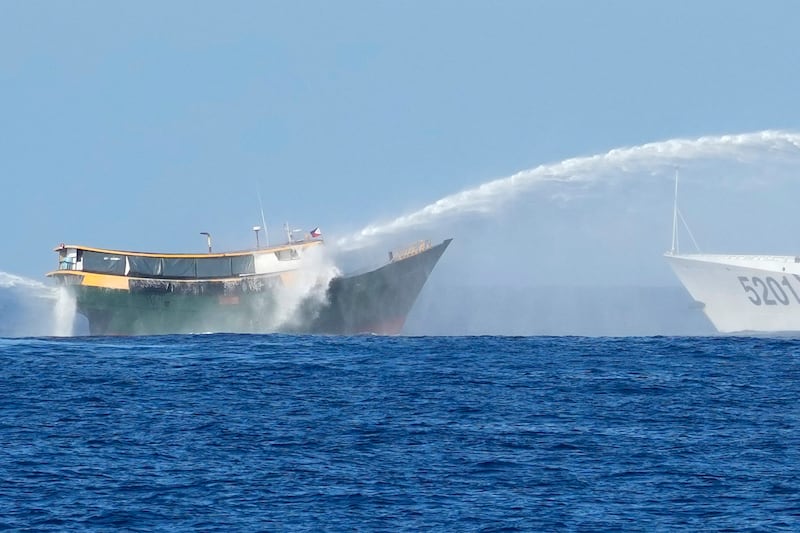The United States, Japan and the Philippines are launching joint naval patrols in the South China Sea in a move seen as countering China’s increased aggression in the region.
The trilateral patrols are part of a "package of initiatives" that top leaders of the three countries will announce at their first-ever summit on April 11, according to the U.S. news outlet Politico, which was the first to report on the plan.
While the Philippines and the U.S. have already been conducting regular joint patrols, this will be the first time that the Japanese Maritime Self-Defense Force takes part in such activity, to be held "at the earliest" possible date, said Japan's Asahi Shimbun.
The Asahi quoted unnamed Japanese government sources as saying that the move is made “in response to China’s growing naval presence in the region.”
There are no further details on the joint plan, but Politico said that it would be “a show of force designed to show Beijing its belligerence won’t be tolerated.”
In recent months, China’s coast guard has stepped up its campaign of harassment near some disputed reefs in the South China Sea, using water cannons against Filipino vessels.

Beijing’s tactics will be high on the agenda at the summit between U.S. President Joe Biden, Japanese Prime Minister Fumio Kishida and Philippine President Ferdinand Marcos Jr. as the three countries form a regional “security triangle.”
"On the South China Sea … the three allies are deeply aligned," said a report by the Center for Strategic and International Studies (CSIS), a U.S. think tank.
“Japan is well positioned to play a linking role among Indo-Pacific countries,” it noted.
“Japan views the East and South China Seas as a connected theater,” CSIS said, adding that Tokyo believes that helping Southeast Asian countries confront China in the South China Sea “is part and parcel to pushing back on Chinese revisionism across the region, including in the East China Sea, where China directly threatens Japanese interests.”
Radio Free Asia learned earlier this year that the Japan International Cooperation Agency is also preparing a 10-year maritime security support plan for four ASEAN nations – Indonesia, Malaysia, the Philippines and Vietnam – to boost security in the South China Sea.
‘Ship riddled with bullets’
The planned joint patrols have met with angry responses from China.
The Global Times newspaper called the move the “latest case of U.S. intention to deplete allies and weaken China” as Washington “recruits Japan” to further destabilize the region and threaten China's surrounding security.
It quoted a Chinese analyst as warning U.S. allies and partners, including Japan and the Philippines, that “they are all pawns for the U.S. to benefit from."
“Beijing's narrative is that every time the situation escalates it is due to its opponents' "provocations", and so it bears no responsibility for any of its aggressions,” said Ray Powell, a maritime security analyst at the Gordian Knot Center for National Security Innovation, Stanford University.
The Chinese military's Southern Theater Command, whose primary area of responsibility is the South China Sea, has just conducted a real combat training exercise in the South China Sea, according to the Ministry of National Defense.
The exercise, held on unspecified dates “in early spring,” aimed at enemy targets, such as “armed fishing boats harassing China in its sea areas,” and Philippine Coast Guard vessels, according to Hu Xijin, Global Times’ former editor-in-chief.
Hu posted a video clip of the training exercise on social media platform X with a stern warning to Manila that "Once the Philippines fires the first shot, I fully support China's PLA (People's Liberation Army) in making [the] Philippine ship riddled with bullets."
“I believe most Chinese people will support it by then,” added the Chinese political commentator.
“China's strategy is to escalate until its adversaries give up, so beating the war drums is intended to cause them to back off,” Powell from Stanford University told RFA.
The analyst said that with its current assertive transparency campaign, Manila is reaching out and forming partnerships with more like-minded nations despite Beijing’s threats.
Edited by Mike Firn and Elaine Chan.
